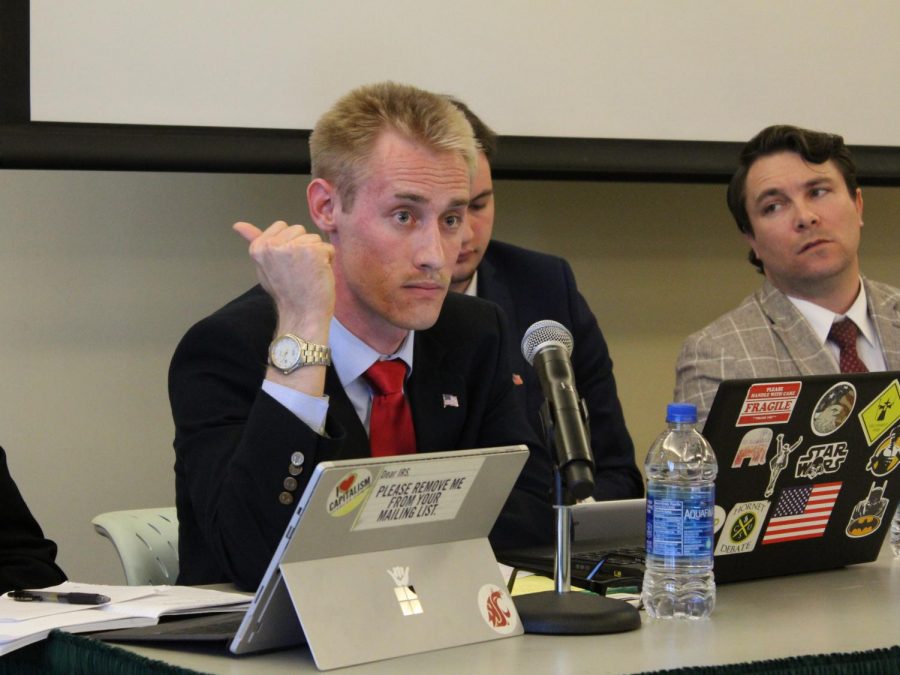College Democrats and Hornet Republicans talk tuition at ‘Great Debate’
Corina Gutierrez – The State Hornet
President of the Hornet Republicans Kyle Shallcross, left, participates in the Great Debate with fellow club member Dean Talley, right, in the Terrace Suite of The WELL on April 17, 2018. The Hornet Republicans have participated in two Great Debates this academic year while the College Republicans have participated in none.
April 18, 2018
The Hornet Republicans and College Democrats participated in a debate intended to help them devise solutions to political problems, such as the potential tuition increase.
The Great Debate was hosted by Associated Students, Inc. at Sacramento State on Tuesday.
Kyle Shallcross, the president of the Hornet Republicans, said at the end of his opening statement that his team was ready for a rigorous and academic debate.
Preceding his statement, Shallcross said there were three things the debaters should ask each other and themselves, which included: “as opposed to what?”, “at what cost?” and “what hard evidence?” as to not take the words at face value and assume that everything everyone is saying is correct and true.
“Tonight’s focus is not to mudsling, it’s not to jab or poke or prod; it’s ultimately to bring two ideologies together to come up with solutions that ultimately direct us in the direction we need to go about these issues before us,” Shallcross said.
Kevin Corona, the president of the Sacramento State College Democrats, said he agreed with his opponent in his opening statement.
“We want to have a rigorous debate about policy here,” Corona said. “It’s something that doesn’t happen as often as I wish it would. We just want to promote our values of progressivism for a brighter future, not just for us as millennials but for everyone.”
RELATED: Panelists discuss free speech on campus
Jay Passi, the director of social sciences and interdisciplinary studies, acted as the ASI student moderator.
“The California State University system is facing a possible tuition increase of $228 a year due to a $171 million funding shortfall in the California state budget,” Passi said. “What is your party’s view on the situation and what role should the state government play in funding higher education?”
Noah Marty, a member of the College Democrats, was granted first position in answering the question.
“When it comes to our party’s stance on the tuition increase, it’s very simple: the CSU system should have their funding and be fully funded,” Marty said. “There simply is no legitimate reason for the state to throw students under the bus in the form of a tuition increase when they have every means and opportunity to fully fund the system without consequences to other programs.”
Marty said that the tuition increase does not equal more classes, a better education or a nicer campus.
Shallcross responded by saying that there are three points that need to be focused on in regard to this issue.
“First is that tuition is an issue that affects us all, unfortunately it doesn’t stop at the state level, it affects colleges across the nation. The second is that higher education is necessary in today’s society,” Shallcross said. “Not only do things like associate’s degrees and high school diplomas not carry as much weight, there’s very few jobs in the job market that we see those as a benefit. And the third is that student loan debt is putting graduates in last place before they even walk up to the start line.”
The Hornet Republicans continued their argument with points regarding loans, their thoughts being that loans should only be given out to those who need it and no one should be denied access to higher education because they cannot afford it.
Corona added that if there is any time to fund education, that it should be in times of good economic standing, which he said the nation is currently in.
“We need to act soon,” Corona said.
































































































































